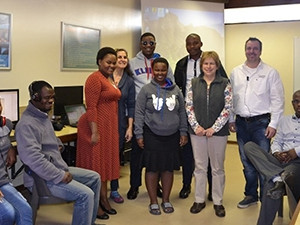
Nelson Mandela Metropolitan University's School of Information Communication and Technology (ICT) in association with the University's disability unit, recently hosted Jaws (Job Access with Speech) training workshops to boost computer skills of visually impaired students.
Nelson Mandela Metropolitan University's School of ICT says it has identified a serious need among its visually-impaired students for assistance with computer skills which are essential for their studies and future careers.
The university's visually-impaired students are already using specialised devices to participate in all their lectures, which include recording devices, laptops and headphones, but they required additional assistance for computer-based work, says the University's disability unit.
Bruno Savaria, Jaws training instructor and software provider, says Jaws is a computer screen reader programme which works with Microsoft Office, Internet Explorer and Firefox. It is specifically designed for computer users whose vision loss prevents them from seeing screen content or navigating with a mouse.
"Jaws reads to the students what's on the computer screen and they can then choose the appropriate keyboard command. Jaws also outputs to refreshable braille displays for users who use braille. Essentially the students then use that information to navigate around the screen," explains Savaria.
The four day-long training workshops were attended by the School of ICT lecturers, disability unit representatives and visually-impaired students.
Siphe Mwellie, intern at the Nelson Mandela Metropolitan University's school of ICT's Public Relations department, says the School of ICT lecturers were impressed with how well the students took to Jaws.
"The students explained that the ICT programme was challenging even for people who can see, the difficulty for visually-impaired students is that their interaction with the computer is done without the screen and the mouse, and completely relies on using the keyboard, which is like learning a new language altogether."
"On the last day of the Jaws training, the students completed a test to make sure they understood the information they had learnt during the week and could apply it to their daily learning environment," he explained.
Virginia A Jacko, president and chief executive of Miami Lighthouse for the blind and visually impaired, says in an opinion article it is ironic that in an age when technology could erase so many barriers for blind students, colleges and universities are not paying enough attention to accessibility in their online services for blind people.
"Colleges must press software designers to make their online applications accessible. Screen-reading software, which responds to computer keystrokes by reading out loud the text displayed on the monitor, is one solution. If every component of a Web site has a text element, the screen-reading software should work.
"I use JAWS software, which works extremely well with Microsoft software. I am able to use Outlook, Word, and Excel by running JAWS simultaneously," she points out.
Online learning, she continues, should be a significant advantage for blind and visually impaired students because of the absence of physical barriers - there is no struggle to locate classrooms, deal with elevators, or walk between buildings on a large campus.
Other software designed for visually impaired people include ORCA, which provides access to graphical desktops environments via user customisable combinations of speech, braille and magnification, Emacspeak, a free speech interface that allows visually impaired users to interact independently with the computer. WebAnywhere, also designed for the visually impaired, is a Web-based screen reader that enables blind people to access the Web from any computer they happen to have access to.
Vodacom recently partnered with the South African National Council for the Blind to train visually-impaired people to use text-to-speech mobile phone apps on their smartphones.
The Nelson Mandela Metropolitan University's School of ICT says it is looking into making the workshops an annual event for visually-impaired students.
Share